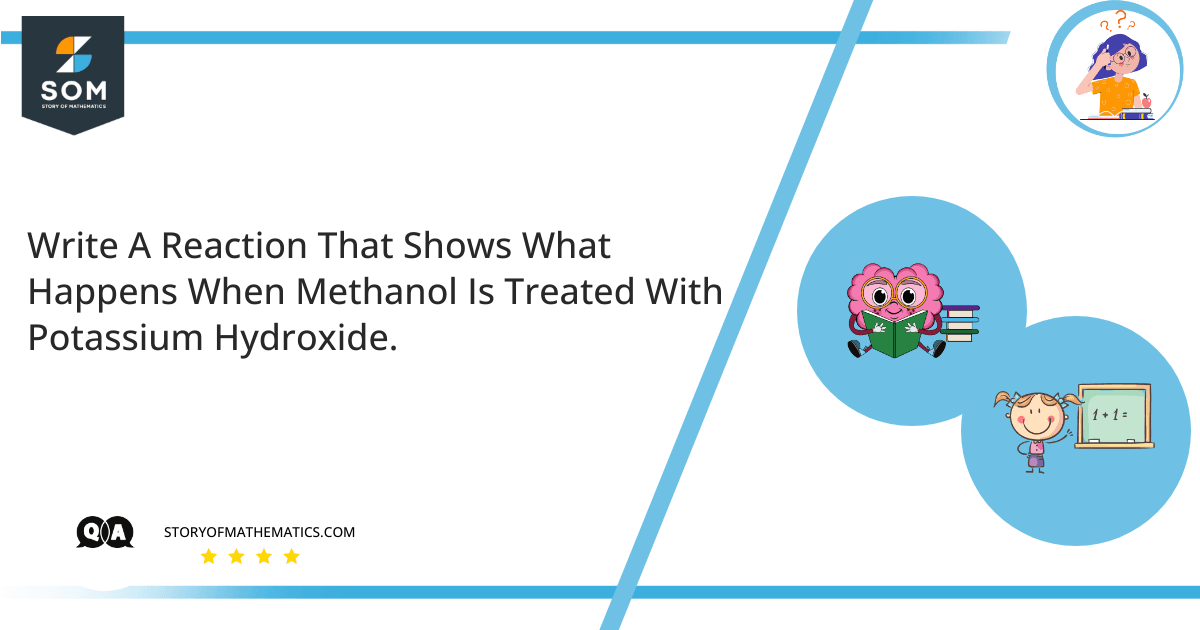
The aim of this question is to find the reaction of methanol, which is an alcohol, with potassium hydroxide, which is a strong base.
The basic concept behind this article is the substitution and elimination reactions of alcohols in the presence of strong basic mediums. When alcohols are mixed with a strongly basic medium, they split and exist in the form of alkoxide ions or halogenoalkanes whereas strong bases like sodium hydroxide or potassium hydroxide split into positive metal ions and negative hydroxide ions.
A Substitution reaction is defined as a reaction in which a part of a molecule is replaced by another atom or a molecular group. The part that leaves the original molecule is called the leaving group. We can say that substitution reaction involves the exchange of elements among the reactants. It is represented by the following general expression:
\[AB+CD\rightarrow AD+BC\]
An Elimination reaction is defined as a reaction in which a molecule of a reactant is broken up into two or more molecules. Such a reaction usually occurs with saturated compounds. It is represented by the following general expression:
\[A\rightarrow B+C\]
Expert Answer
Given that:
First Reactant = Methanol $CH_3OH$
Second Reactant = Potassium Hydroxide $KOH$
Methanol is alcohol whereas Potassium Hydroxide is a strong base. When they are reacted together, they form an aqueous solution.
First, we will use the Elimination Reaction to break both the reactants.
Potassium Hydroxide $KOH$ is split up into its positive and negative ions as follows:
\[KOH\Rightarrow K^++{\rm OH}^-\]
$K^+$ is a positively charged ion called Cation.
${\rm OH}^-$ is a negatively charged ion called Anion.
Methanol $CH_3OH$ is split up into positive and negative alkoxide ions as follows:
\[CH_3OH\Rightarrow H^++{CH_3O}^-\]
$H^+$ is a positively charged ion called Cation.
${CH_3O}^-$ is a negatively charged ion called Anion.
These Cation and Anions then follow the Substitution Reaction to replace each other’s ions as follows to form Potassium Methoxide $CH_3OK\$ in an aqueous solution.
The ${\rm OH}^-$ ion from Potassium Hydroxide $KOH$ reacts with $H^+$ from methanol $CH_3OH$ to form water $H_2O$.
The ${CH_3O}^-$ ion from methanol $CH_3OH$ reacts with $K^+$ from Potassium Hydroxide $KOH$ to form Potassium methoxide through an exothermic reaction as follows:
\[(H^++{CH_3O}^-)+(K^++{\rm OH}^-)\Rightarrow({CH_3O}^-+K^+)\ +(H^++{\rm OH}^-)\]
So:
\[CH_3OH+KOH\Rightarrow{CH_3O}^-K^++H_2O\]
Hence, the exothermic equilibrium elimination and substitution reaction of methanol and potassium hydroxide result in the formation of potassium methoxide and water. Water causes potassium methoxide to exist in an aqueous form.
Numerical Result
When methanol $CH_3OH$ is treated with potassium hydroxide $KOH$, it forms Potassium Methoxide $CH_3OK$ in aqueous form as per the following reaction:
\[CH_3OH+KOH\Rightarrow CH_3OK+H_2O\]
Example
Write a reaction when methanol is treated with sodium hydroxide.
Given that:
First Reactant = Methanol $CH_3OH$
Second Reactant = Sodium Hydroxide $NaOH$
So as per Elimination reactions:
\[NaOH\Rightarrow{\rm Na}^++{\rm OH}^- \]
\[CH_3OH\Rightarrow H^++{CH_3O}^- \]
As per Substitution reaction:
\[(H^++{CH_3O}^-)+({\rm Na}^++{\rm OH}^-)\Rightarrow({CH_3O}^-+{\rm Na}^+)\ +(H^++{\rm OH}^-) \]
\[CH_3OH+NaOH\Rightarrow{CH_3O}^-{\rm Na}^++H_2O \]
When methanol $CH_3OH$ is treated with sodium hydroxide $NaOH$, it forms Sodium Methoxide $CH_3ONa$ in aqueous form as per the following reaction:
\[CH_3OH+NaOH\Rightarrow CH_3ONa+H_2O \]
